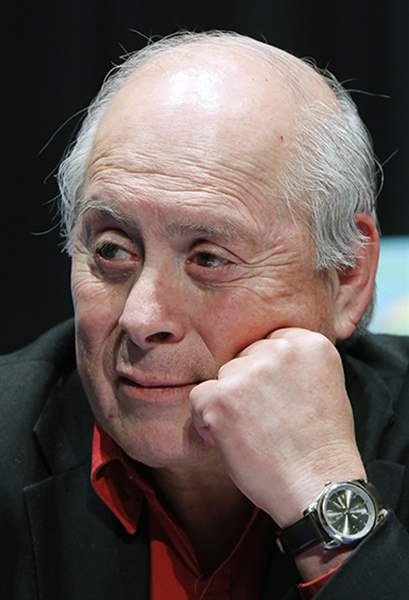
Commentary
Visit with a prophet
10/6/2013
Velasquez
THE BLADE/JEREMY WADSWORTH
Buy This Image

I went to see Baldemar Velasquez at his office, at the headquarters for the Farm Labor Organizing Committee, or FLOC. I had met him once before and heard him speak, and I knew who he was long before that.
But when you meet people on their home turf, it’s different. You see and hear more.
He told me on the phone: “We have kind of a photo museum here.”
They sure do.
The whole history of FLOC and the farm labor movement are on the walls.
I have a son who is a photographer, and he has taught me to look at photos with care. I just visited him in New York where we looked at some photographic art at the Museum of Modern Art. Nothing I saw there compared with the power of the pictures on the wall at FLOC. None was taken by a professional photographer. None was intended as art.

Velasquez
But many of those photos at FLOC were art. And history.
There were the pictures from FLOC's first big campaign — for the workers in a tomato cannery in Warren, Ind. There were the pictures of the Campbell’s Soup march from Toledo to Camden, N.J., a distance of 560 miles.
There were the pictures of Mr. Velasquez with Cesar Chavez, his colleague and mentor. There was the picture of FLOC’s lawyer, Jack Kilroy, getting his skull smashed by deputy sheriffs in Indiana.
A picture really is worth a thousand words.
And then, in his office, Mr. Velasquez showed me some contemporary pictures. He is now working mostly with migrant workers in North Carolina.
They work the tobacco fields for small farmers, who themselves are poor. But the Mexican-American farm workers in the fields are abjectly poor. They are peasants, serfs, indentured servants who get only a part of the minimum wage because the crew captain who recruited them keeps part of their earnings.
They live in one room shanties, 15 to 20 people in a one-room shack, filthy toilets in filthy bathrooms. State law requires only one sink for that many people, and there they must wash the tobacco off their clothes in one sink for that many and all their needs.
He showed me pictures of all of that. I saw the poverty of 100 years ago, the poverty of the third world in North Carolina today.
He tells me he is fighting for better working conditions for these people and that the two men he is dealing with at R.J. Reynolds are “good men” in a bad system.
Mr. Velasquez is 66, but he wanted to experience what the tobacco workers are experiencing. So he went to work for a few days in the North Carolina tobacco fields. He wore out a pair of gloves a day.
Most workers don’t own gloves, but the nicotine permeates your clothes and skin. And most workers don't have three changes of clothes or access to decent showers.
The other problems are heat stroke, dehydration, and fear — fear of being in trouble, of being fired, of not having enough to eat if one of those things would happen. These workers do not want to be photographed or filmed. They don’t even want to stop and ask for water. Many are victims of human trafficking.
Mr. Velasquez has spent most of his life in Toledo and the Toledo area. He says the youth gang problem hurts his heart. To him the solution is work and organization. He sees people in need; he thinks they need to be organized.
He asks, why can’t we pay these kids to organize their neighborhoods for good instead of crime? Why can’t we teach them to patrol the neighborhoods for safety instead of fear?
Another Toledo legend, Oscar Bunch, told me this about Mr. Velasquez: “He’s been through the. ... He’s not interested in money. Neither was Chavez.”
True enough. When Mr. Velasquez won the MacArthur “genius grant” some years ago, he first “paid back everyone I owed money who thought they’d never get paid.”
The rest was put into a trust for FLOC.
Mr. Velasquez has no pension and refused the efforts of a friend to create one in his behalf on the grounds that it would put him out of touch, and harmony, with the people he champions.
The man is a moral genius; a practical saint.
He says: “Speak truth to power with love in your heart. Conquer your anger. Seek justice with reconciliation.”
Toledo has many heroes, some visible, some hidden. Surely this man is our greatest citizen.
I don’t know who will be elected mayor next month. But whether it is Mike Bell or Mike Collins, I hope he will spend some time with Baldemar Velasquez.
Keith C. Burris is a columnist for The Blade.
To watch a Bill Moyers interview with Baldemar Velasquez, use this link: http://billmoyers.com/guest/baldemar-velasquez
Contact him at: kburris@theblade.com or 419-724-6266.